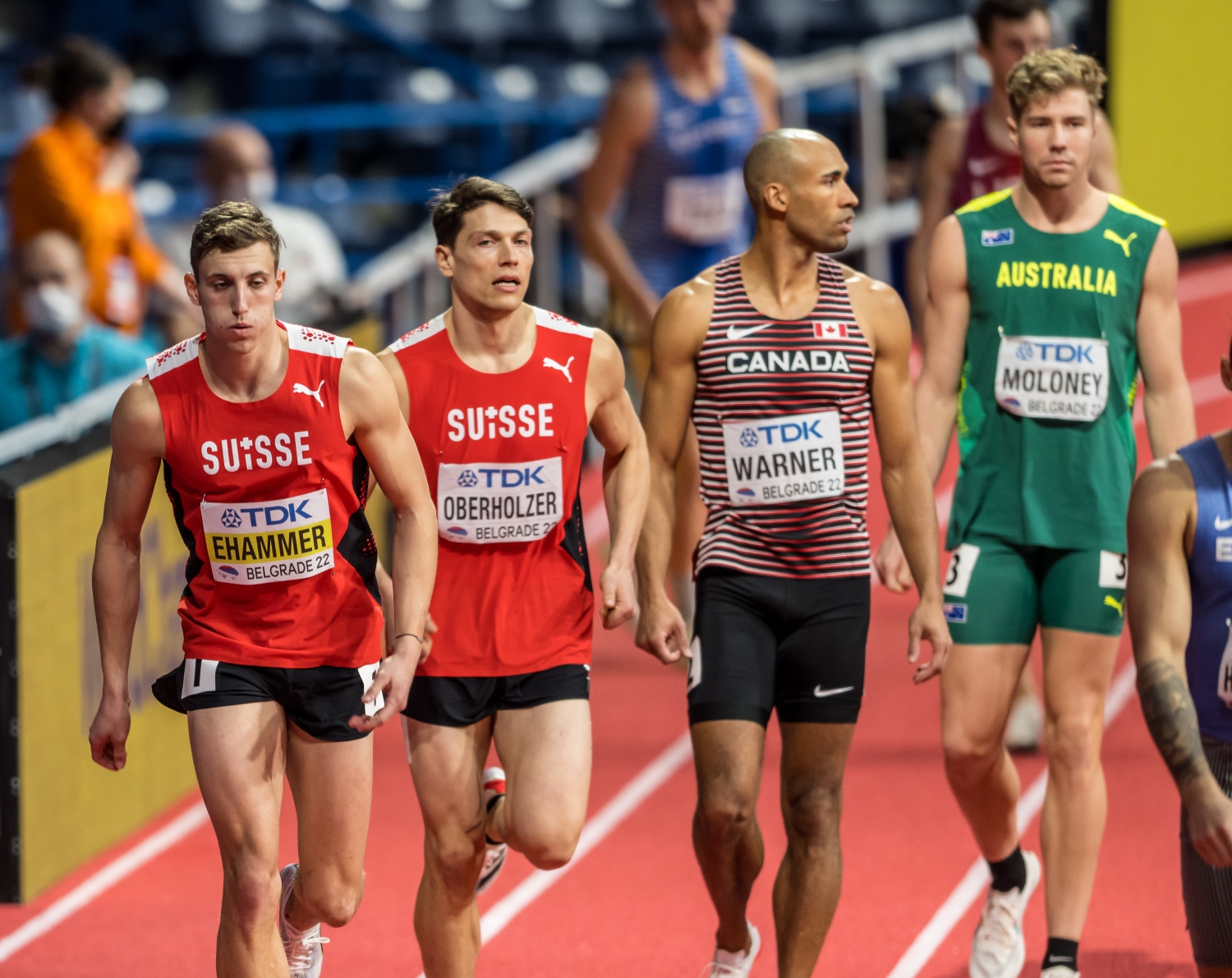HEPTATHLON
60M
“It’s bloody fast!” was the conclusion after the first event of the men’s heptathlon at the World Indoor Championships in Belgrade. The words were those of Australia’s Ash Moloney, making his indoor debut. The speedy track propelled Moloney, amusingly seeded into the slower heat, to an inaugural PB of 6.70s.
It also gave the Olympic champion Damian Warner a platform to improve his best by 0.06s to 6.68s, marginally faster than Moloney. A suite of other improvements came behind Ash and Damian in their respective heats: Simon Ehammer of Switzerland by 0.03s to 6.72s, Garrett Scantling of USA by 0.02s to 8.84s, Lindon Victor of Grenada – after a false start -by 0.03s to 6.91s. Andri Oberholzer of Switzerland came very close to his first sub-seven second run, improving by an impressive 0.11s to 7.00s and Karel Tilga had what would be his best result of the weekend with a 0.02s PB of 7.07s.
Moloney offered a further insight into how he was expecting the two days to unfold, telling the post-race infield interviewer he expected the heptathlon to be much easier than a full decathlon. Let’s see what his view is at the end of Day 2.
After 1 event:
- Damian Warner CAN 999
- Ash Moloney AUS 992
- Simon Ehammer SUI 984
- Garrett Scantling USA 940
- Hans-Christian Hausenberg EST 933
- Lindon Victor GRN 915
- Steven Bastien USA 904
- Jorge Ureña ESP 900
- Andri Oberholzer SUI 882
- Dario Dester ITA 879
- Karel Tilga EST 858
- Kai Kazmirek GER 806
LONG JUMP
You have to sympathise with Hans-Christian Hausenberg. He jumped a PB of 7.96m, improving on his 7.92m from Tallinn in February, but that was still only the third best jump of the competition. He is edging closer and closer to 8m and it can only be a matter of time before he joins Warner and Ehammer in that club. The Canadian and the Swiss did jump over 8m, but it was “only” 8.05m and 8.04m respectively, some 20cm short of their eyewatering lifetime bests. The pair are so closely matched in this event; Warner has the outdoor world long jump decathlon best of 8.28m and Ehammer the indoor equivalent with 8.26m.
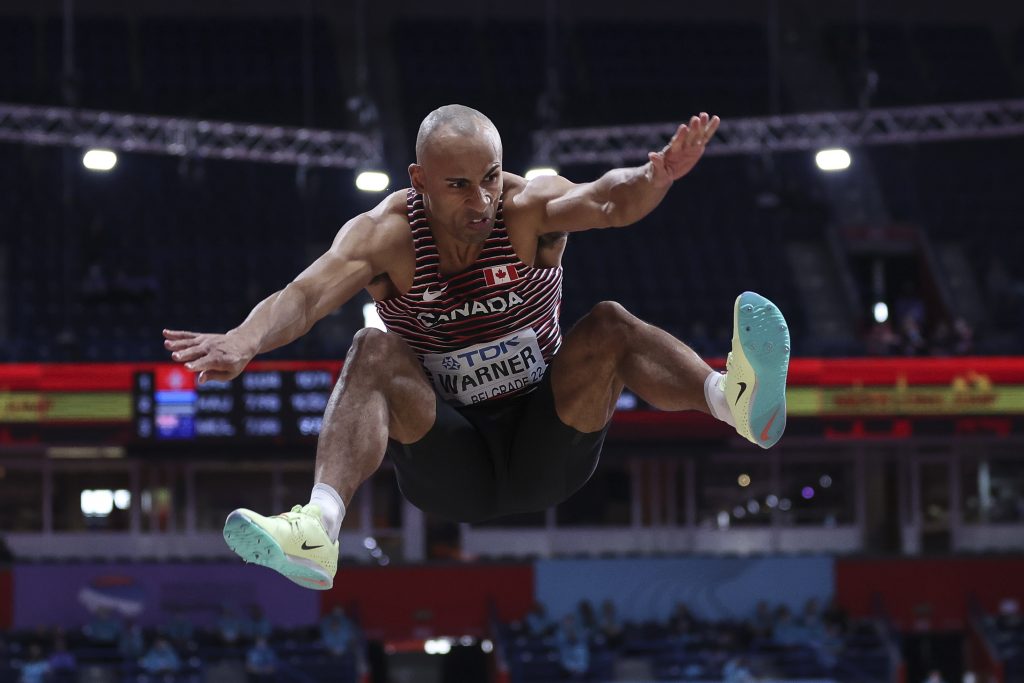
Later in the day, the men’s individual long jump final took place just a few metres away from the heptathlon. Greece’s Miltiadis Tentoglou, the Olympic champion from Tokyo, was (finally) erasing Ehammer’s world lead, as he won gold with 8.55m. “A little bit of my heart would like to jump with the long jump specialists” Ehammer confessed at the end of Day 1. “It would be a great chance to also take a medal, because 8.27 was bronze. I know I can jump this result, and it was a little bit sad. But I’m a decathlete.”
Damian Warner added: “I think as decathletes we sometimes get overlooked by other people, and they say, ‘you only do the decathlon because you can’t do this, that or the other thing’. Athletes like myself and Simon and Ashton – people who can do really well in individual events – try to go out there and show that if we wanted to do that, we could.”
Behind Hausenberg, Moloney added 10cm to his outright lifetime best with 7.82m, and Oberholzer 3cm to his with 7.57m. Steven Bastien of USA and Lindon Victor both jumped 7.56m, a lifetime best for Victor.
After 2 events the standings were very much as expected – no surprises as the four sprint-jumper kings separated themselves from the next four, all of whom were then clustered around the mid-1800s.
After 2 events:
- Damian Warner 2072
- Simon Ehammer 2055
- Ash Moloney 2007
- Hans-Christian Hausenberg 1983
- Lindon Victor 1865
- Steven Bastien 1854
- Garrett Scantling 1850
- Andri Oberholzer 1834
- Karel Tilga 1803
- Jorge Ureña 1793
- Dario Dester 1765
- Kai Kazmirek 1608
SHOT
Now, time for Scantling, Tilga and Victor – the big throwers – to make up ground on Warner, Ehammer and Moloney. The 16m+ guys are also big high jumpers, so a recalibration of the leader board towards the end of Day 1 seemed likely.
Garrett didn’t mess about and threw a PB of 16.37m in the first round, which he matched exactly in the third. Tilga and Victor took a little longer to warm up: Tilga started with 13.83m, improved to 14.84m and finally 15.36m. Victor had similar throws: 14.82m in the first round, then his best of 15.65m in the third.
But Warner was solid, close to 15m and just 1cm short of his season’s best with 14.89m, and Ehammer likewise steady with 14.23m. After throwing over 15m for the first time ever earlier this season Oberholzer had a good effort of 14.76m, and Dario Dester of Italy was the only other man over 14m with 14.03m.
After 3 events, Scantling and Victor had overtaken Hausenberg into fourth and fifth, the American just 5 points away from Moloney; Tilga edged ahead of Oberholzer, and both ahead of Bastien.
This would be the last event contested by Kai Kazmirek of Germany who had to withdraw due to stomach problems (and he wouldn’t be the last).
After 3 events:
- Damian Warner 2855
- Simon Ehammer 2797
- Ash Moloney 2729
- Garrett Scantling 2724
- Lindon Victor 2695
- Hans-Christian Hausenberg 2688
- Karel Tilga 2615
- Andri Oberholzer 2609
- Steven Bastien 2533
- Jorge Ureña 2515
- Dario Dester 2495
- Kai Kazmirek 2300
HIGH JUMP
Jorge Ureña of Spain has had a challenging season, and ankle problems have kept the prolific indoor medallist below his best. His heptathlon season best was sub-6000, and his participation in Belgrade came by way of the final wildcard issued by World Athletics. It proved to be the right choice.
Ureña had not cleared 2m all season – just 1.86m in December and 1.96m in February. But he seemed to find new life in the Štark Arena and not only cleared 2m but delivered a 10cm season’s best of 2.05m. Lindon Victor jumped well to clear 2.05m as did Simon Ehammer, matching his outdoor PB. The clearance for Ehammer was a significant one, as Warner only cleared 1.99m. If Ehammer wanted to stay close to Warner, he needed those little wins in the events where they were relatively evenly matched.
The best performance was by Steven Bastien, who equalled his outdoor PB of 2.08m.
Scantling, Moloney and Tilga were gathered together at 2.02m, alongside Hans-Christian Hausenberg, a little lower than we might have expected from the big jumpers. However, Scantling’s woes were just about to get much worse, as would be revealed at the start of Day 2.
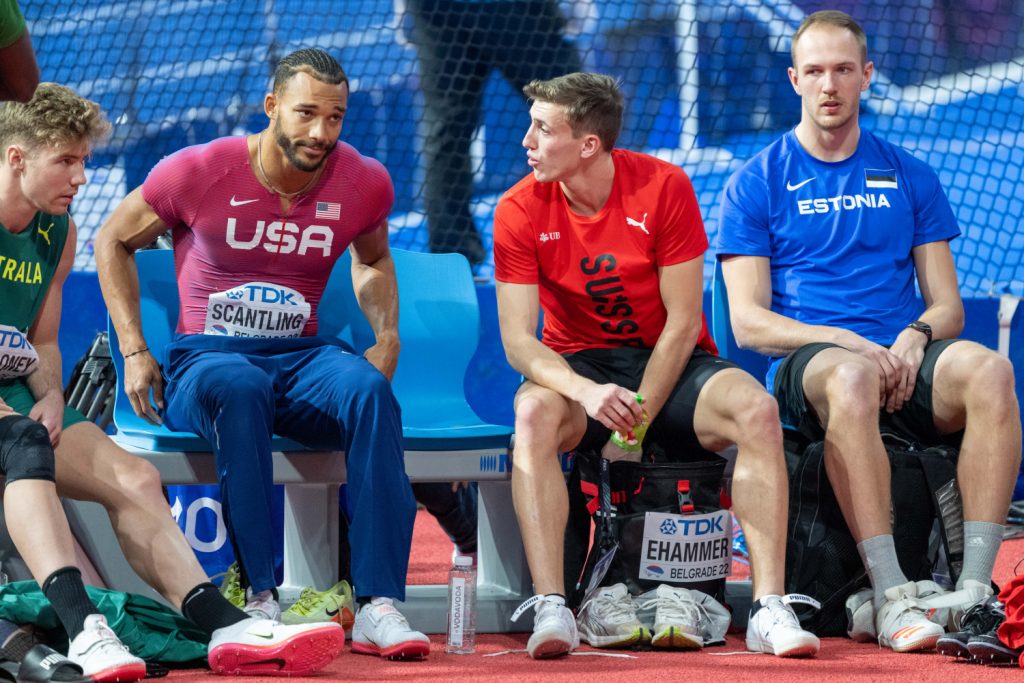
At the end of the first day, Warner was holding off Ehammer by just 2 points. About 100 points behind, Moloney, Scantling and Victor were just a few points of each other, and Hausenberg a further 35 points back.
Delighted with his high jump, Simon Ehammer was pleased overall with his position at the end of Day 1.
“The last time I jumped this high was 2018 at the Swiss championships. Every year it was tough when I didn’t jump this high, and right now it’s finally here. My 60m was great, 4 hundredths behind Damian – that’s crazy. The long jump: the first jump was great behind the board. The expectation was a little bit more because after the first jump I thought that we were going to go far. Shot put totally solid, great.”
And looking forward to Day 2 and Ehammer’s other speciality, the 60m hurdles?
“Fast – fast, fast, fast! The track is great, it’s bouncy and I like it. The goal is to be near Damian in the hurdles. Then high, high, high in the pole vault. And then run. We will see.”
After 4 events:
- Damian Warner 3649
- Simon Ehammer 3647
- Ash Moloney 3551
- Garrett Scantling 3546
- Lindon Victor 3545
- Hans-Christian Hausenberg 3510
- Karel Tilga 3437
- Steven Bastien 3411
- Andri Oberholzer 3403
- Jorge Ureña 3365
- Dario Dester 3262
60M HURDLES
A few hours before the start of competition, a second athlete withdraw due with stomach problems. This time it was one of the contenders: Garrett Scantling who had been fourth overnight. With two strong events on Day 2, Scantling would have been a key factor in the fight for medals. Speedy recovery to both Scantling and Kazmirek.
But even without Scantling, and even without the reigning champion Kevin Mayer, it was still a formidable hurdles line up in the second heat. Everyone bar Moloney – who of course had no mark on record – had sub-eight second PBs. This time Moloney had been seeded into the faster heat, compared his seeding in the 60m.
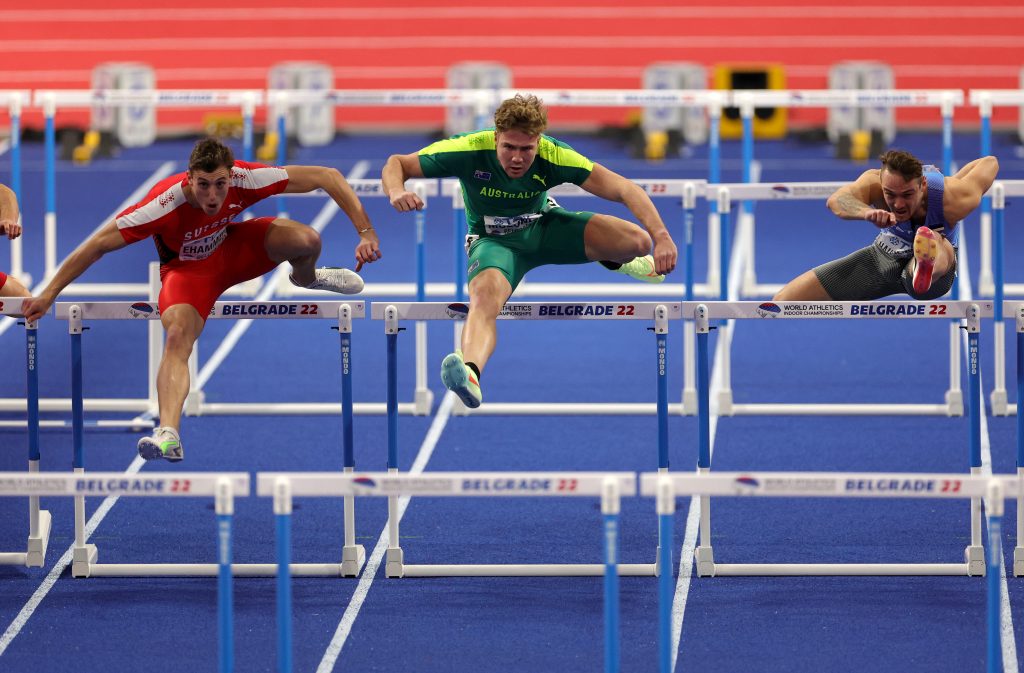
The rejuvenated Ureña ran 7.98s, just ahead of Hausenberg 7.99s. Moloney posted 7.88s and Ehammer 7.75s, ever more consistently under 7.80s.
Damian Warner had run 7.63s a few weeks ago in Canada, just 100th short of his PB. So we knew his hurdling was sharp. What could he do on this track? He started off well, but the second half of his race was scrappy, as – reminiscent of the great Allen Johnson – he battered several hurdles and was lucky to stay upright to the line. Surely he had lost precious hundredths?
Maybe he had, but he still ran 7.61s – a lifetime best and a time that would have placed him sixth ahead of David King, Milan Trajkovic and Wilhem Belocian in the individual 60m hurdles final.
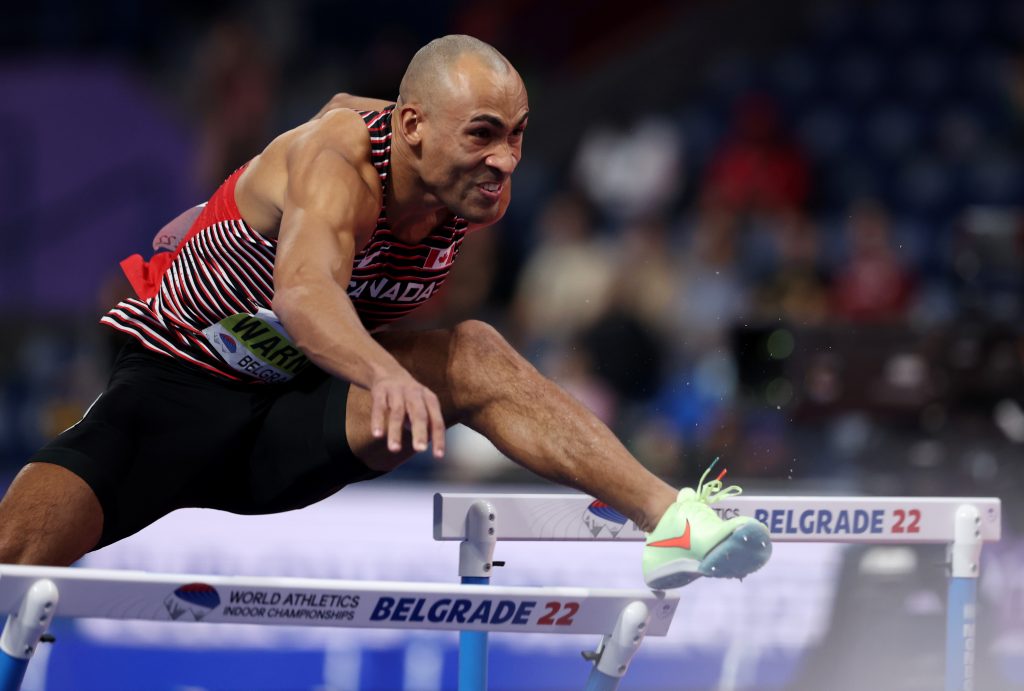
In the first heat, Andri Oberholzer was fastest with a lifetime best of 8.12s.
With no Scantling to shake things up, the standings stayed the same in the top three, but Hans-Christian Hausenberg overtook Lindon Victor into fourth place, and Bastien and Oberholzer moved ahead of Tilga into sixth and seventh.
While Warner’s time would have place him well in the individual event, two combined eventers were competing in the individual 60m hurdles on the final day of the championships. Portugal’s Abdel Larrinaga ran 6.69s in his heat to proceed to the semi-final, where he finished 8th in his heat with 7.70s. And Andri Oberholzer’s training partner Finley Gaio just missed out on a semi-final place, running 7.74, the same time as the athlete who took the final 24th place.
“It’s great to be a decathlete and be able to run those times,” Gaio said, echoing Warner’s comments. “It’s nice to know you can score a lot of points in the hurdles. But if you compete against the pros in hurdles, it’s a huge difference – they just get out of the blocks so much faster than a decathlete. So, I hope for next year I can qualify in the hep for indoors.”
After 5 events:
- Damian Warner 4731
- Simon Ehammer 4693
- Ash Moloney 4563
- Hans-Christian Hausenberg 4494
- Lindon Victor 4426
- Steven Bastien 4358
- Andri Oberholzer 4355
- Jorge Ureña 4352
- Karel Tilga 4323
- Dario Dester 4214
POLE VAULT
Onto pole vault, and Lindon Victor opened the competition with three attempts at 4.40m. He made it over and continued well onto a best of 4.70, but unfortunately with the best vaulter in the competition one place ahead of him and some fast runners just behind him, he would be unlikely to improve on his fifth place. Karel Tilga, who had been visibly tending to his knee, went out with a best of 4.50m, before his Estonian teammate Hausenberg had even entered the competition.
Ehammer and Warner came in at 4.70m, and Ureña and Hausenberg at 4.80m. The competition was mercifully free of no heights, no throws and no marks, although Jorge came close with three attempts at his opening height of 4.80m.
Ash Moloney’s pole vault PB outdoors is 5.05m, but as he took his early jumps, his enormous height above the bar was ominous. Was he about to cause an upset and challenge Ehammer for silver? And, in turn, would Warner be able to vault close enough to Ehammer to ensure the advantage of his superior 1000m remained intact? Every further height that Ehammer could clear would take 2 seconds out of Warner’s 14 second superior PB in the 1000m. The scenarios suddenly became very, interesting.
Ehammer and Warner both had good clearances at 4.80m, Moloney even better. Ash went over 4.90m first time, while Simon and Damian both had a failure. Simon cleared at his second attempt, but Damian still took it down. Finally Warner, with that amazing competitive temperament, made it over at the third attempt.
Moloney had another massive clearance at 5.00m, Ehammer and Warner both two failures. Final attempt, and Ehammer cleared it, while Warner did not. Warner’s lead over Ehammer was reduced to single figures.
Onto 5.10m and Moloney, again, massive over the bar for an outright PB. Ehammer now had his eye on Moloney behind him, and Warner in front. There was little point in the Swiss catching the Canadian only to have the Australian vault higher and hunt down both of them. But Ehammer cleared 5.10m, equalling his outdoor best, and held the gap in points back to Moloney. Neither would go any higher, but Ehammer had moved ahead of Warner – the first time that anyone had been ahead of Warner in a combined event since the World Championships in Doha 2019.
Meanwhile, Hans-Christian Hausenberg was having his moment, out on his own after clearing 5.20m, and equalling his 5.30m PB from February 2020. That moved him within 6 points of Moloney in bronze. The Australian was much faster than the Estonian so a medal was unlikely for the latter, but it was a significant performance for Hausenberg, who had stepped away from combined events in 2021 before returning, a new man, in 2022.
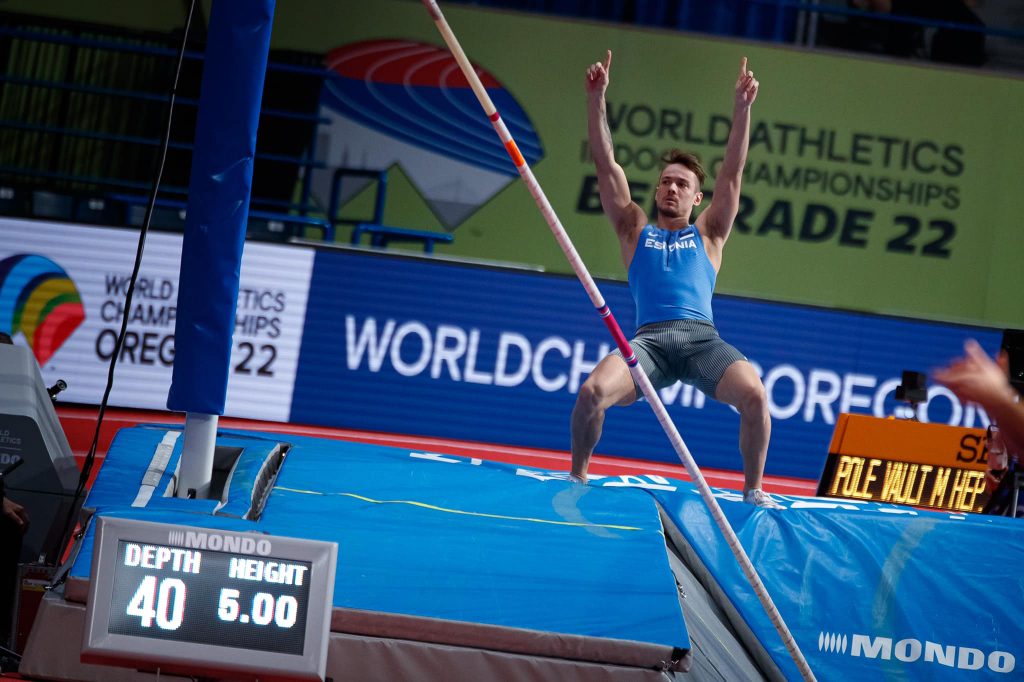
Andri Oberholzer was below his best with 5.00m (he has cleared 5.20m this season) but since Bastien only cleared 4.70m, the Swiss moved ahead of the American and ahead of Lindon Victor, and into fifth place.
After 6 events:
- Simon Ehammer 5634
- Damian Warner 5611
- Ash Moloney 5504
- Hans-Christian Hausenberg 5498
- Andri Oberholzer 5265
- Lindon Victor 5245
- Jorge Ureña 5201
- Steven Bastien 5177
- Dario Dester 5094
- Karel Tilga 5083
1000M
Notwithstanding the shock of seeing a name other than Warner’s at the top of the standings, it was clear that – barring disaster or some sort of divine intervention in Ehammer’s 1000m pace – the gold was Warner’s.
As every combined event fan will know, the participants all compete with different profiles across seven or 10 events. That’s different from individual event specialists who are all of a similar standard in the same event. Some combined eventers gain the majority of points from the first few events, some from the last, but each has their own unique profile across the runs, jumps and throws.
Going into the 1000m, Warner simply needed to finish a few seconds ahead of Ehammer, and with a PB some 14 seconds faster, that was unlikely to be a problem. However, there was still one unknown – the 1000m of Moloney in the final event of his first heptathlon. The Australian’s outdoor 1500m time was a few seconds faster than Ehammer’s, but that was after nine events, not six. How would that translate indoors, especially if there was a chance that he could upgrade his Olympic bronze to World silver?
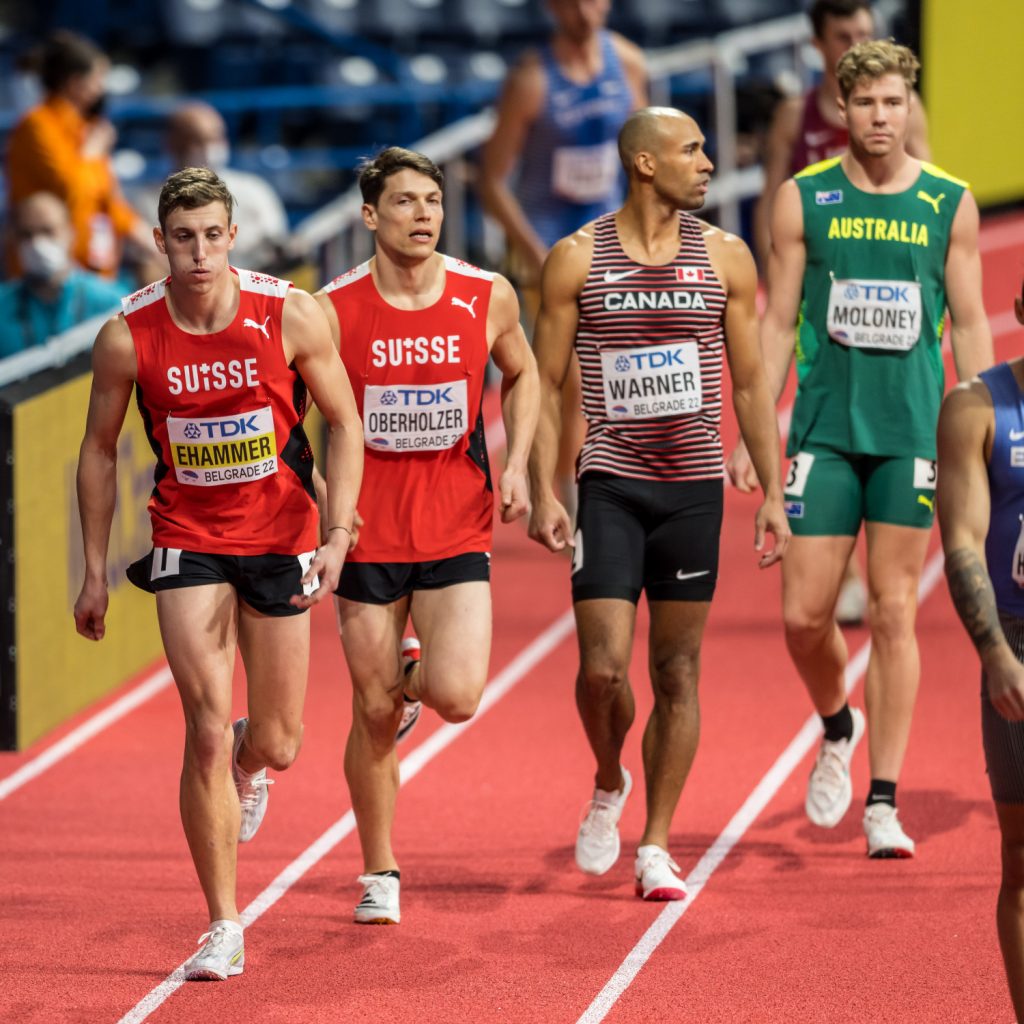
Here is what each of the leading athletes needed to do to break their PBs, reach 6000 points, or set national records.

The race began and the fastest men in the field, Steven Bastien and Karel Tilga, went straight to the front, followed closely by Warner, Moloney and Jorge Ureña. Ehammer set off more steadily. Damian continued to stick with the American and Estonian, utilising their pace to keep him close to the pace of his own lifetime best, 2:37.12.
In the third lap, Andri Oberholzer, much the faster of the Swiss, overtook Ehammer and hared after the pack, Ehammer sticking with him as best he could. Moloney continued to push on, the gap between Moloney and Ehammer seemingly growing with every 200m lap. Ehammer’s 23-point lead over Warner was long dead and buried but, with every lap, Moloney was hacking back the 130 points between himself and Ehammer.
Bastien crossed the line first in 2:37.89, Tilga and Warner just behind him in 2:39.28 and 2:39.56 respectively. Next was Ureña in 2:42.28. Then Moloney. He crossed the line in 2:43.01 – faster than many had expected – and secured 840 points. If Ehammer ran slower than 2:55.45, the Australian would take silver.
The clock ticked on. Dester was just behind Moloney in 2:43.49 and Oberholzer a storming run to break his PB with 2:43.61. Five seconds later, Lindon Victor finished in 2:48.21, also a lifetime best.
Two forty-nine.
Two fifty.
Two fifty-one.
Two fifty-two. Still no Ehammer.
He finally crossed the line in 2:53.54 – cutting it close, but just hanging onto silver. Hausenberg rounded out the field in 2:57.10.
Damian Warner won gold with 6489 points, a Canadian record and second on the all-time list of athletes. Only Ashton Eaton has scored higher.
Simon Ehammer won silver with 6363 points, a Swiss record and ninth on the European all-time list of athletes.
Ash Moloney won bronze with 6344 points, an Australian and Oceania record.
Hans-Christian Hausenberg was fourth with a PB of 6191, consolidating his place in fifth on the Estonian all-time list. Only Erki Nool, Mikk Pahapill, Maicel Uibo and Tilga have scored more.
Andri Oberholzer was fifth in a PB of 6099, after only scoring over 6000 points for the first time a few weeks earlier.
Steven Bastien was sixth in a 200+ point PB of 6074, improving his indoor event to match his huge improvement outdoors in 2021.
Jorge Ureña was seventh in 6049, his 10th heptathlon over 6000, performing yet again on the big stage after a season in which he had suffered with injury.
Lindon Victor was eighth in 6029, breaking his brother Kurt Felix’ Grenadian record, and becoming the first man from his country to score over 6000 points indoors.
Karel Tilga was ninth in 5964, in his first combined event competition after the Olympics and after struggling with injury.
And Dario Dester yet again scored close to 6000 points, with 5929, despite his last-minute inclusion in the field and injury challenges.
Here are how the positions changed over the seven events.
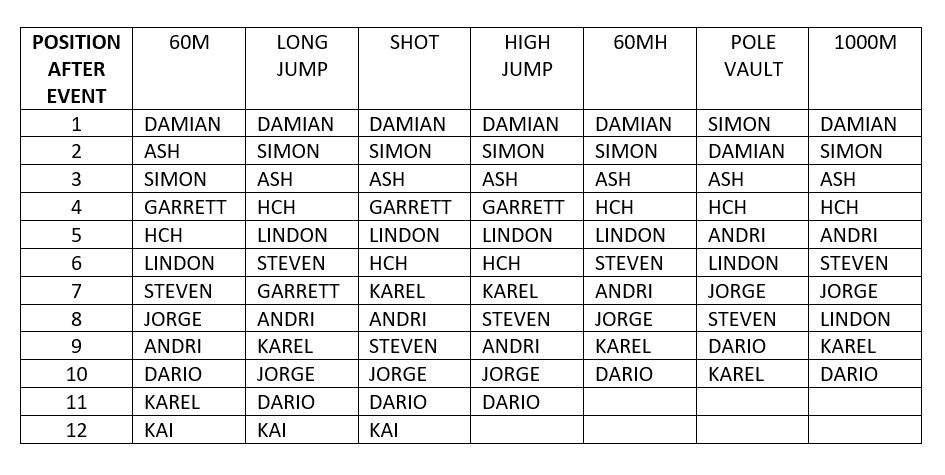
The Olympic, and now world indoor, champion Damian Warner acknowledged the challenge his young opponents had brought, ensuring that the title was not an easy one for him to win.
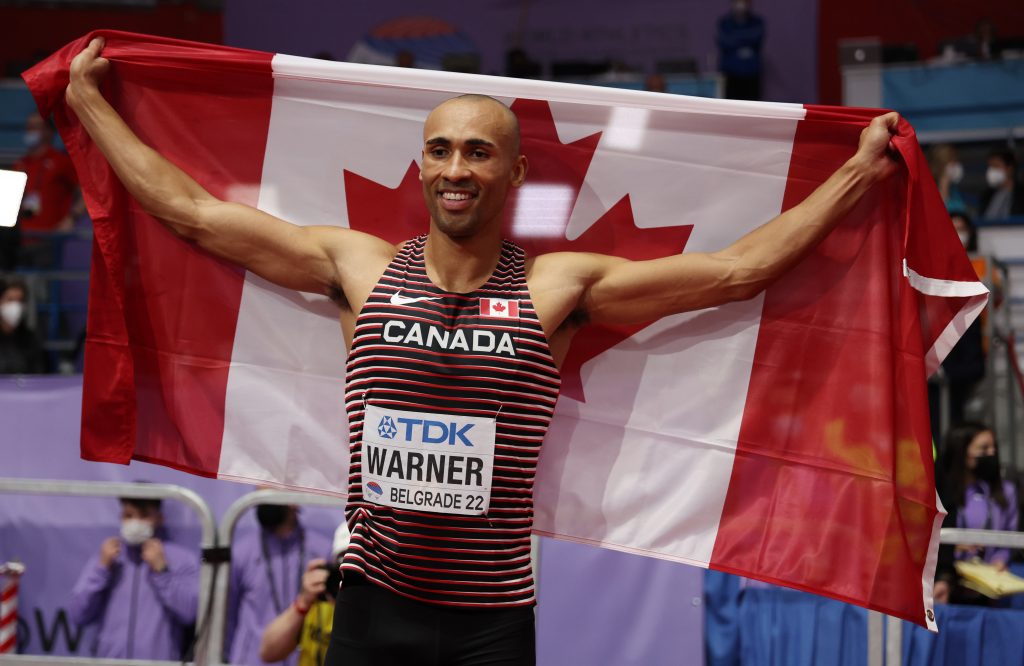
“It’s not easy, it’s never easy, especially when you’ve got guys like Ashley Moloney and Simon Ehammer, even Garrett Scantling who didn’t finish,” Warner told Decathletes of Europe. “It was a tough competition and they made me fight. That’s the best way to start off the season. You don’t want it to be something easy where you can get complacent. You want it to be something that challenges you, and makes you get better. And that’s what those guys do. All those young guys cause me so much stress, but that’s only going to make me be better. That’s the best thing for me.”
“Before I came,” Damian continued, “I was writing what I thought I could score. I was hoping I could score 6502 if I did everything right. And I wasn’t that far off. So, I was pretty happy, to be in that ballpark at this point in the season. In the last 2 weeks before this competition I was debating if I was even going to come – I’ve been a little bit tired, a little bit exhausted, dealing with being a father and all the obligations of sponsorship and speaking. But to come out here and perform like I did, I’m really happy.”
Ehammer was delighted with his silver medal.
“I took silver at the world champs! It’s so cool to do better than last year. In 2019 juniors, then corona, a really great season in 2020, a bad season in 2021 – and now I came back stronger than ever. It’s so motivating for the summer.”
His teammate Andri Oberholzer was equally chuffed with his fifth position, and especially pleased to improve in some events with ageing personal bests. “I was pretty good in 60m, 60mh, 1000m and long jump – my long jump PB is from 2017 in Bydgoszcz outdoors so I’m so, so happy to improve this. I have still one [PB] from Bydgoszcz, my high jump 2.08m, so it’s my next goal to beat that one.”
Hans-Christian Hausenberg continued his inspiring return to combined events, describing his emotions:
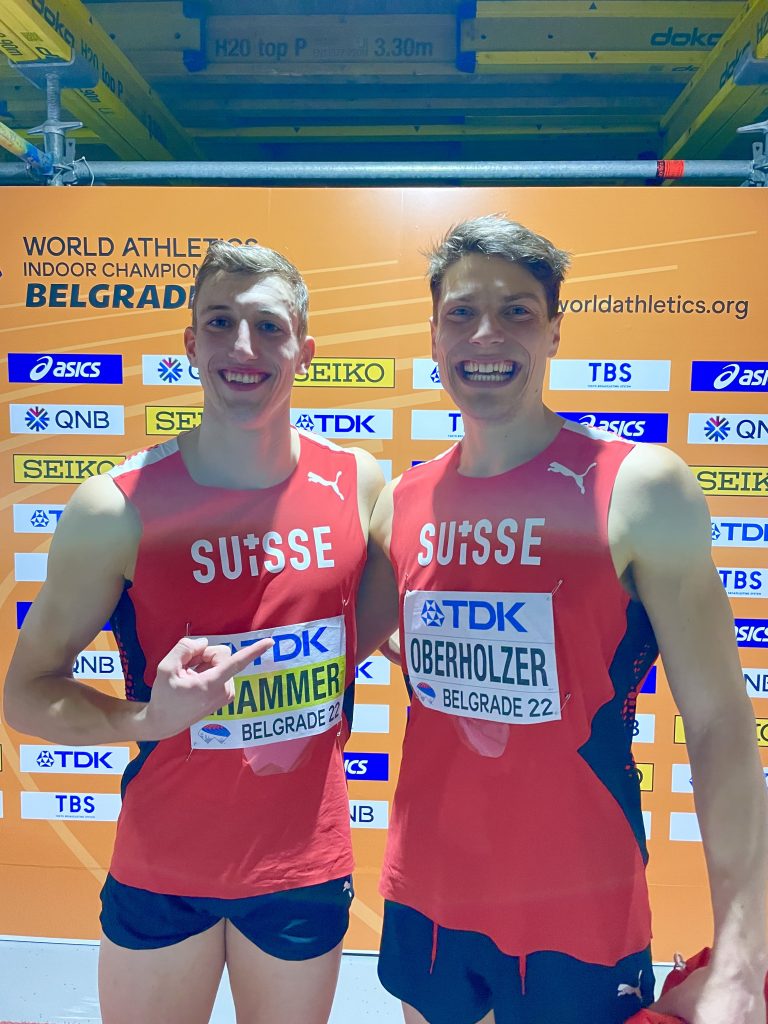
“I’m so proud. It was amazing before I even came here – I didn’t expect to get here. In Tallinn I was expecting just to complete a heptathlon but finally I came here, I did 6191, and came 4th. It’s amazing. I’m so happy.”
Hausenberg’s demeanour in Belgrade was visibly different from Tallinn a few weeks back, and he explained what had changed. “I’m more confident. In Tallinn I was so tense, and the anxiety was overwhelming. Yesterday and today I was super confident, and I just enjoyed it.”
Steven Bastien revised his heptathlon PB to match his outdoor improvements, and he credits the progress with getting his physical and mental approaches in synch. Describing his decathlon improvement in 2021, he said:
“The biggest thing that really changed was I put stuff together that I’ve been doing in practice and executed it and was able to call upon high energy stuff in the moment when it mattered.”
It hadn’t all gone to plan in Belgrade, so Bastien is confident that there is more to come, particularly at the US Champs for combined events on 6-7 May:
“I definitely felt I could have executed a little bit better in some of the events, but overall I was happy with how I competed. My body felt ready but my brain’s ability to execute some of the stuff I’ve been doing in practice fell through – in pole vault I blew threw some poles and didn’t have my coach here to guide me through that process. Overall it was cool to do another hep – I haven’t made it through a hep in a long time so it’s cool to see a bigger number. With USAs way earlier this year, I feel like this is my first outdoor meet in a way. I feel like I have a good sense of what I’m doing well, and what I need to work on. I’m just excited to get into outdoors and see where the year takes me.”
And the final word to Ash Moloney –was the heptathlon the easier gig compared to the decathlon?
“I learned a lot here,” Moloney told Decathletes of Europe. “Indoors it’s a completely different beast. I reckon it’s more tiring than the decath.”
“Decath, you’ve got some events where they’re kinda chill. Like the discus. You just go out there, have a chuck. Sit down. Have a chuck. Whereas this, it’s all the power events. Next event’s power, next event’s power, next event’s power.”
“So it’s different, but I love it. It’s the part of the decathlon that I love. I was in this to win this. I reckon I’m doing OK.”
Final result:
- Damian Warner 6489 NR
- Simon Ehammer 6363 NR
- Ash Moloney 6344 AR
- Hans-Christian Hausenberg 6191 PB
- Andri Oberholzer 6099 PB
- Steven Bastien 6074 PB
- Jorge Ureña 6049
- Lindon Victor 6029 NR
- Karel Tilga 5964
- Dario Dester 5929
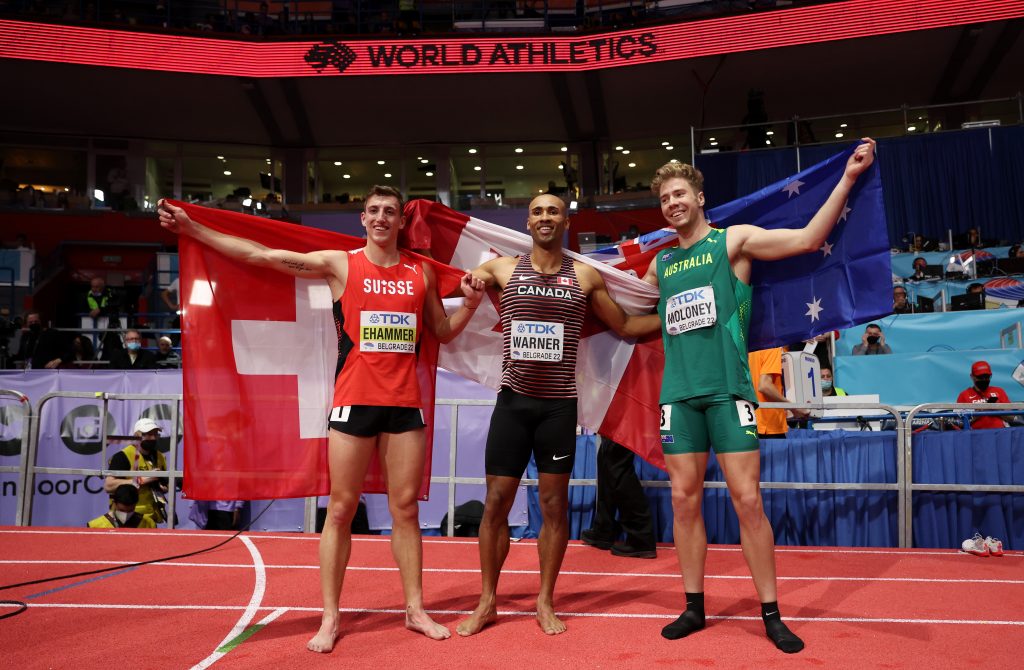
PENTATHLON
60M HURDLES
Yuliya Loban, one of the small Ukrainian team who had made it to Belgrade, got the pentathlon underway with a strong start in the first heat of 60m hurdles. Sveva Gerevini, the new Italian national record holder, and Adrianna Sułek, the world leader from Poland caught up with her in the second half of the race. Gerevini won in a PB of 8.35s, followed by Sułek in 8.36s, two hundredths away from her PB. Loban ran 8.61s in fourth behind the Dorota Skřivanová, the unexpected find of the season from the Czech Republic, in 8.47s.
The second heat included the hurdles specialist Kendell Williams of the USA, but it was the European indoor silver and European U23 bronze medallists who set the pace. Noor Vidts of Belgium and Holly Mills of Great Britain and Northern Ireland both ran 8.15s, followed by Williams in 8.20s. The time was a small lifetime best for Mills, but it was almost one tenth of a second improvement by Vidts, signalling what was to come from the Belgian.
The defending champion Katarina Johnson Thompson ran 8.45s, well below her best, hinting that while she might be healthy and relishing the opportunity to compete, we wouldn’t be seeing her in world champion form.
After 1 event:
- Holly Mills GBR 1095
- Noor Vidts BEL 1095
- Kendell Williams USA 1084
- Chari Hawkins USA 1075
- Sveva Gerevini ITA 1050
- Adrianna Sułek POL 1048
- Leonie Cambours FRA 1046
- KJT GBR 1028
- Dorota Skřivanová CZE 1024
- Yuliya Loban UKR 993
- Claudia Conte ESP 991
- Sarah Lagger AUT 961
HIGH JUMP
Turbulence hit the standings as focus switched from the hurdles to the high jump. Adrianna Sułek leaped from sixth place after the first event into the lead, as she replicated her lifetime best of 1.89m from the Polish championships a few weeks ago. For the rest of the field, 1.83m was the significant mark and five athletes cleared the bar at that height. Leonie Cambours of France and Claudia Conte of Spain were among them, and moved up three and four places respectively, while Holly Mills’ season’s best clearance of 1.75m meant that she dropped from first to ninth.
Noor Vidts, Chari Hawkins of the USA and KJT also cleared 1.83m, while Kendell Williams and Dorota Skřivanová cleared 1.80m, an equal PB for the Czech.
After 2 events:
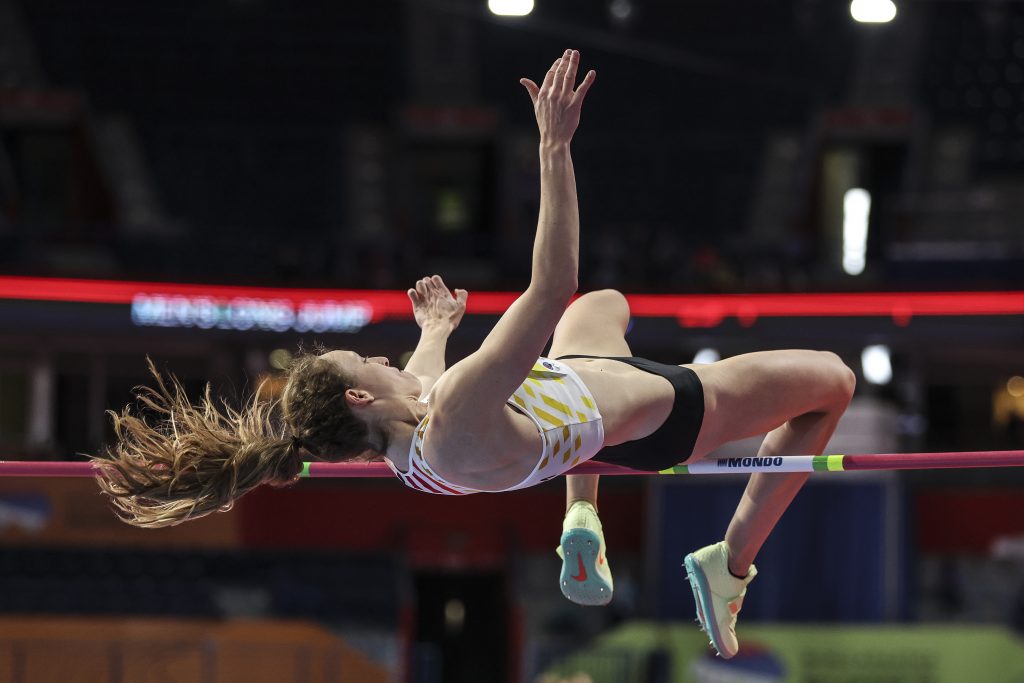
- Adrianna Sułek 2141
- Noor Vidts 2111
- Chari Hawkins 2091
- Leonie Cambours 2062
- Kendell Williams 2062
- KJT 2044
- Claudia Conte 2007
- Dorota Skřivanová 2002
- Holly Mills 1998
- Sarah Lagger 1902
- Yuliya Loban 1896
- Sveva Gerevini 1880
SHOT
Two of the strongest putters in combined events were in the field, Sarah Lagger of Austria and Yuliya Loban. Both have lifetime bests over 15m, and both had thrown over 14.75m this season. However, on this occasion Lagger managed only 13.15m, and Loban 13.48m.
Two athletes did throw over 14.00m, Noor Vidts with 14.03 to return to the top of the standings, and Chari Hawkins with 14.02m. Hawkins’ first round throw had originally been logged as 14.66m which would have been a 40cm PB. But a technical error in measurement meant it was scratched, and she was permitted a further throw.
Sułek threw a solid 13.40m, which kept her just 12 points behind Vidts overall. Hawkins’ best of 14.02m allowed her to close the gap between her position in third and the athlete in second place, now Sułek, from 120 points to just 9 points.
Holly Mills’ 13.68m helped her move from ninth place to sixth. And it is testament to KJT’s improvement in this event that she moved up a place from sixth to fifth. That had more to do with her modest high jump of 1.83m positioning her artificially low, but the world champion’s consistent performance over 13m is encouraging nonetheless.
After 3 events
- Noor Vidts 2907
- Adrianna Sułek 2895
- Chari Hawkins 2886
- Kendell Williams 2777
- KJT 2773
- Holly Mills 2771
- Dorota Skřivanová 2723
- Leonie Cambours 2723
- Claudia Conte 2716
- Yuliya Loban 2655
- Sarah Lagger 2639
- Sveva Gerevini 2521
LONG JUMP
Fourteen of the thirty-six jumps in the competition were fouls – see the social media of your choice for elite long jumpers’ views on the new take off rules – and unfortunately three of those belonged to Chari Hawkins. The final two events are typically the American’s weakest, and with Kendell Williams, KJT and Holly Mills all just over 100 points behind her, she was already vulnerable to overtaking. However, that became moot as her competition came to a premature halt.
In the end KJT’s best was 6.08m, and with that it was confirmed that the champion would not be retaining her crown. Holly Mills managed 6.28m, not too far off her season’s best with her new take-off foot, while Kendell Williams had the best jump of the competition with 6.69m.
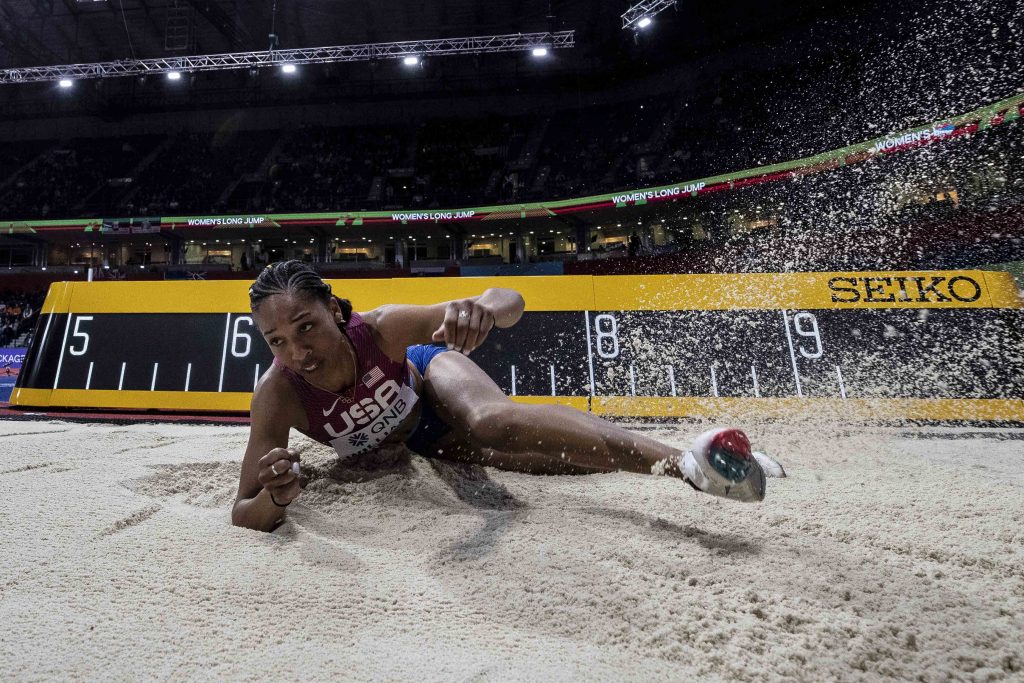
However, at the top of the leader board, Noor Vidts and Adrianna Sułek were locked in a duel, both at the peak of their abilities. Adrianna jumped first, setting the tone with a 14cm PB of 6.43m. Noor responded, her first round jump a 9cm PB of 6.60. After a foul, Sułek then equalled her best coming into the competition, 6.29m. Vidts meanwhile then jumped 6.55m, again further than her pre-competition best, and finally 6.33m.
The Belgian extended her 12-point lead over the Pole after the shot into a 67-point advantage after the long jump. Both had indoor 800m PBs of 2:12, so if they ran to form Vidts should win. But there are few more fearsome competitors than Sułek, now with the confidence of having been world leader for much of 2022 so far. If Vidts blinked, Sułek would pounce. In the meantime, the numbers were stacking up and Nafi Thiam’s Belgian record of 4904 was now in sight for Vidts.
As expected, Williams moved up into third, only 34 points behind Sułek but with an 800m PB some 3 seconds slower. Bronze seemed decided behind the tussle for gold behind Vidts and Sułek. However, Holly Mills was looming in Williams’ rear-view mirror, some 136 points behind, but armed with a ferocious 800m.
In fifth place was 23-year-old Dorota Skřivanová, who had until this season a best of just over 4200 points. Now, after the penultimate event of the World Indoor Championships pentathlon, she found herself one place ahead of the world champion.
After 4 events:
- Noor Vidts 3947
- Adrianna Sułek 3880
- Kendell Williams 3846
- Holly Mills 3708
- Dorota Skřivanová 3669
- KJT 3647
- Claudia Conte 3606
- Leonie Cambours 3566
- Sarah Lagger 3492
- Sveva Gerevini 3467
- Yuliya Loban 3417
- Chari Hawkins 2886
800M
Hawkins did not start the final event, and nor did KJT.
“I’m fit and I’m happy,” said the world champion “but I knew I couldn’t give it my all for the 800m so I’ve decided to withdraw from the last event in the Pentathlon.”
“This was my first opportunity to compete since Tokyo and I wanted to test myself in a competition again.
“I’ve learned a lot. I’ve now got a plan in place for the rest of the season and I’m now really excited to get back out there and defend my titles.”
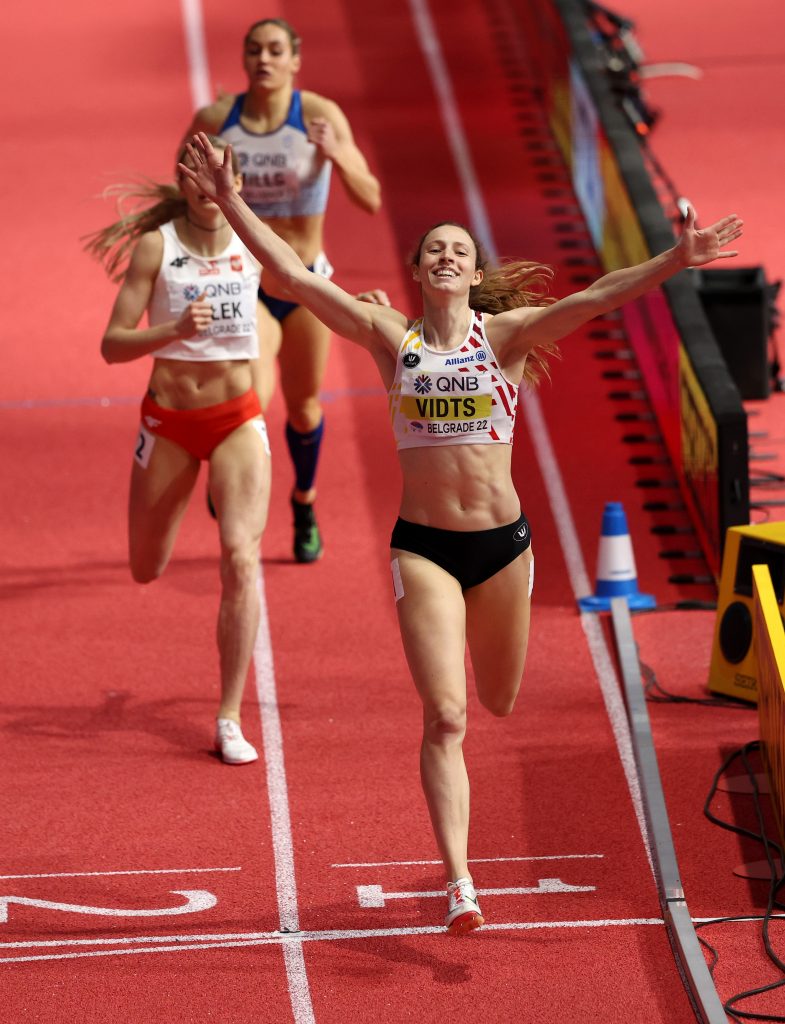
The remaining 10 athletes took off when the gun fired, and Holly Mills immediately went to the front, accompanied by Sveva Gerevini. As Mills continued to push on through the first lap into the second, Vidts stuck like glue to Sułek.
Meanwhile, Williams was hovering near the back of the field, seemingly confident that Mills would not run her down. Come the third lap and Sułek kicked, Vidts going with her, swapping the lead and then both began to close down Mills. They passed the Brit and Sułek attempted in vain to overtake Vidts, but the Belgian had won. Mills crossed the line behind Sułek and then waited for Williams. Had Mills done enough for bronze?
Vidts’ time was a 4-second indoor PB of 2:08.81, taking her to a score of 4929. That broke Nafi Thiam’s Belgian record and moved her to 6th on the all-time list of athletes in the pentathlon, behind Natalia Dobrynska, KJT, Irina Belova, Jessica Ennis-Hill and Carolina Kluft.
Sułek’s time was a 3-second indoor PB of 2:09.56, taking her to a Polish record of 4851, almost 100 points more than her world lead coming into the competition.
And Williams ran 2:19.23, holding onto the bronze medal with 4680, but only 7 points ahead of Mills.
Holly Mills ran 2:09.97, a 2-second indoor PB, to finish on 4673 points in 4th, adding 80 points to her PB coming into the competition. If your main takeaway from the British performance was that KJT failed to finish, then you’re missing the enthralling emergence of the most exciting, and engaging, British combined event talent in years.
“I gave it everything I had,” Mills told Decathletes of Europe afterwards. “In that situation you can’t play it safe. You literally just have to go for it. I stuck to my race plan, I did everything I could, came away with a PB, and today I was half a second short. Everyone goes for it in the 800. Everyone knew what they had to do to finish where they did. And everyone gave it their best. And that’s just how the scores turned out.”
“It still feels strange, I still see myself as a baby. With the likes of KJT and Kendell, who are getting later into their career, I’m just starting out and to be contending with them on such a big stage in such a high-pressure situation, it really shows that I’m growing into my multi-event shoes.”
In turn, Williams had praise for young Briton as she reflected on her own performance to win the bronze medal.
“Seven points – that’s probably the closest margin I’ve held on by, and I’m just really fortunate that I was able to walk away with a medal. My first couple of events didn’t start off the way I wanted them to, so I was a little bit nervous. But I knew with long jump coming up that that was one of my stronger ones, and an opportunity to make up points. So I was really happy to see the 6.69. That gave me a little bit of a cushion – obviously I needed it because Holly’s a great runner, a great competitor, and I’m just happy that I was able to hold on.”
“I was looking at her, away, far away, and thinking – OK Kendell, just relax and just try to finish. 800 is one of the ones that I struggle with so, I knew that it was going to be tough going in, but I just tried to stay calm and remain tough and just finish the best I could.”
France’s Leonie Cambours, who finished seventh, also enjoyed her first senior championships, albeit not satisfied with her performance: “I was a little sad about my 5 disciplines– the shot put and long jump were bad but I am satisfied to have a place in the final. I wanted more…but the future will be big.”
Here is how the leader board changed throughout the 5 events.
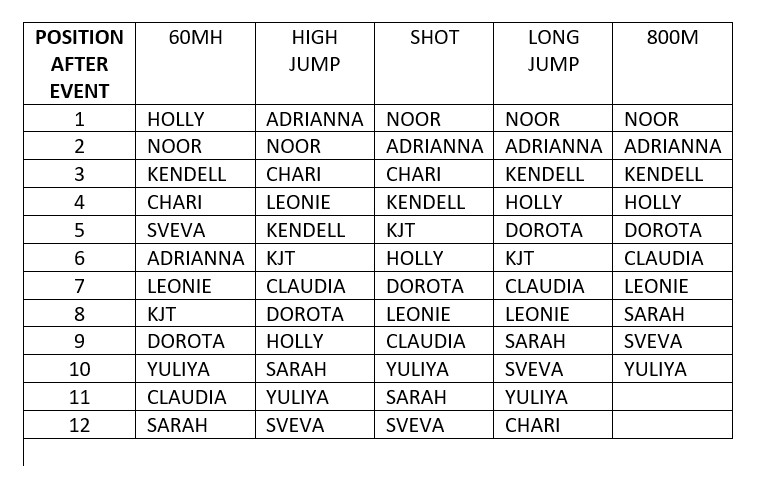
Final result:
- Noor Vidts 4929 NR
- Adrianna Sułek 4851 NR
- Kendell Williams 4680
- Holly Mills 4673 PB
- Dorota Skřivanová 4566 PB
- Claudia Conte 4499 PB
- Leonie Cambours 4442
- Sarah Lagger 4391
- Sveva Gerevini 4377
- Yuliya Loban 4192
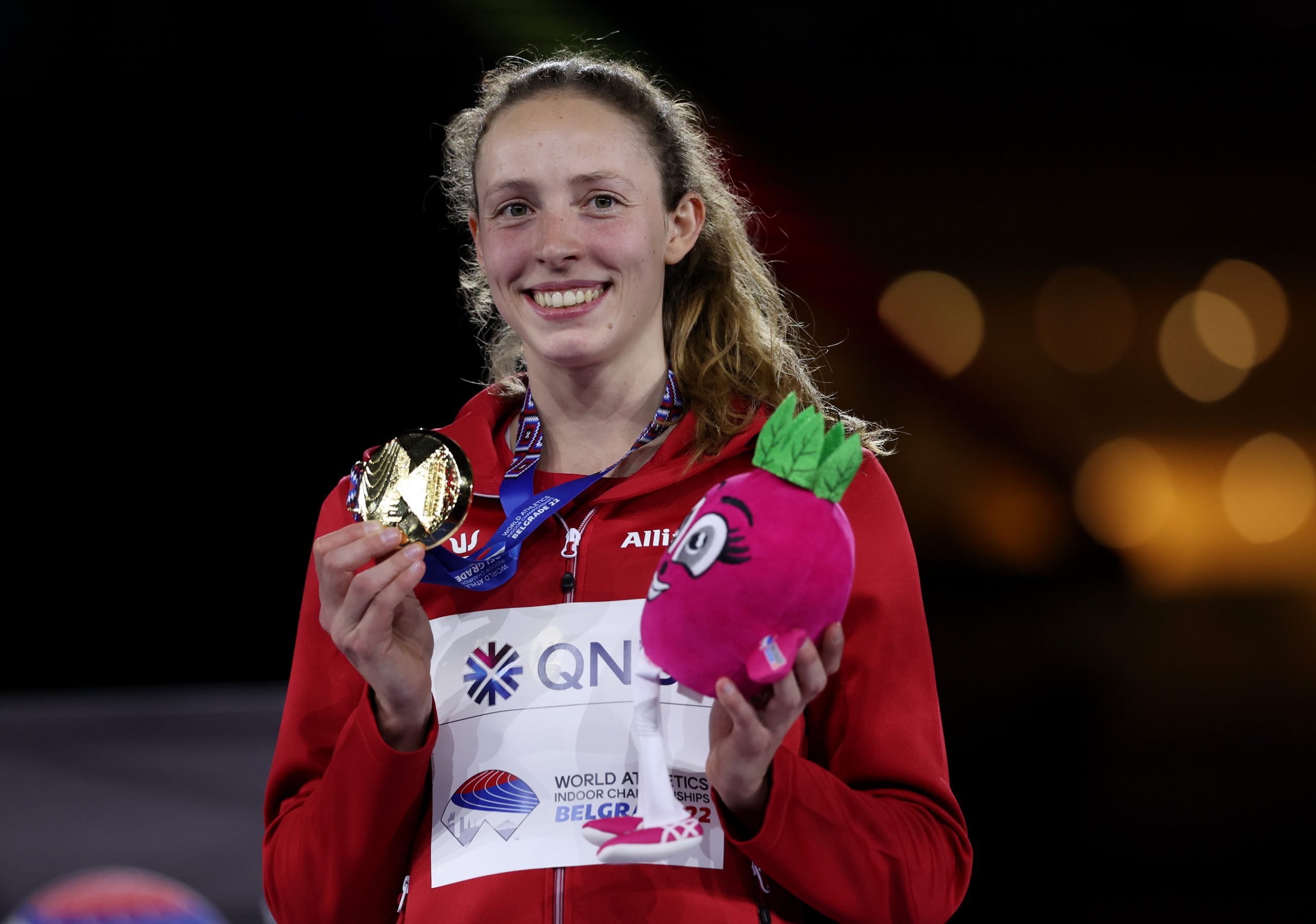
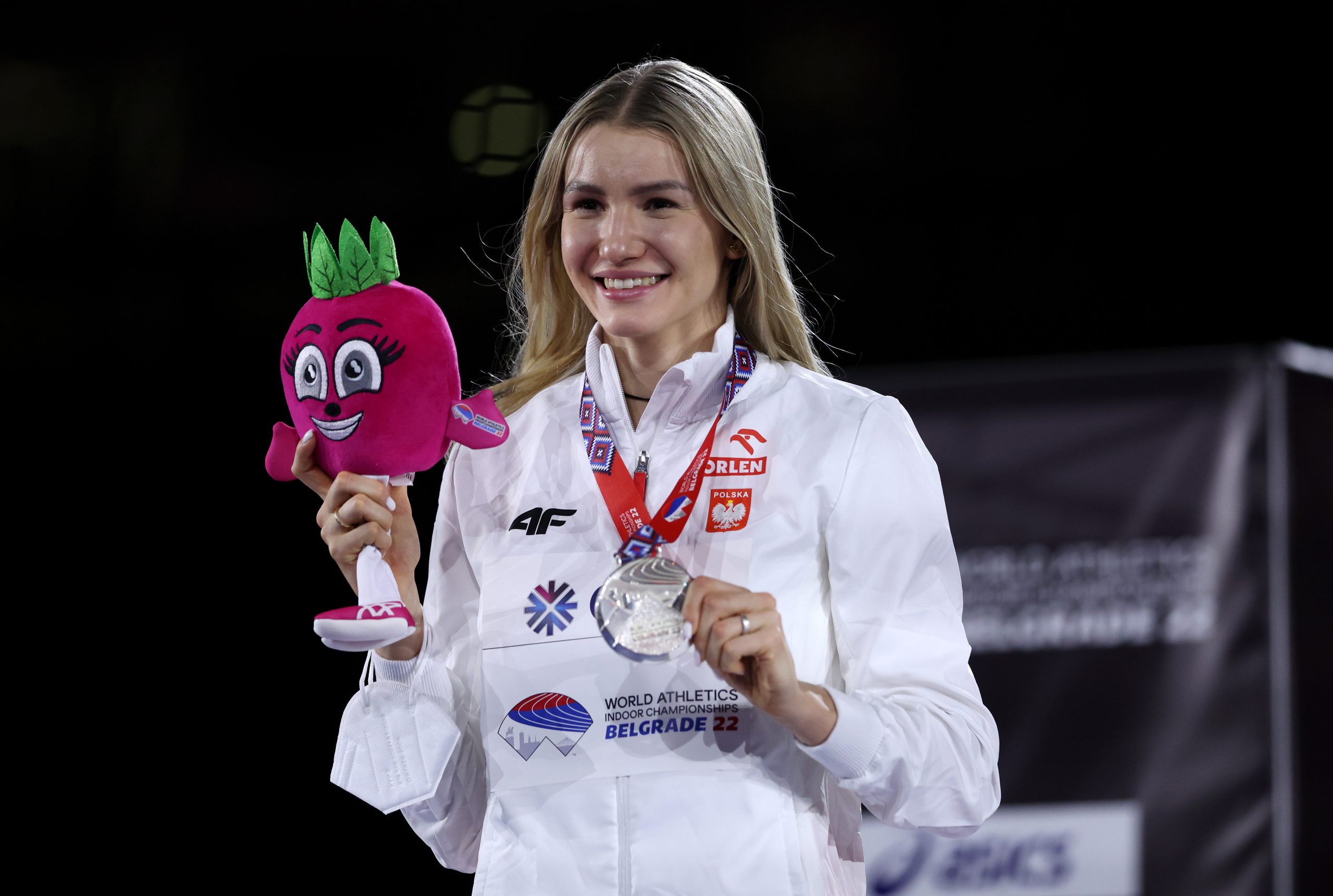
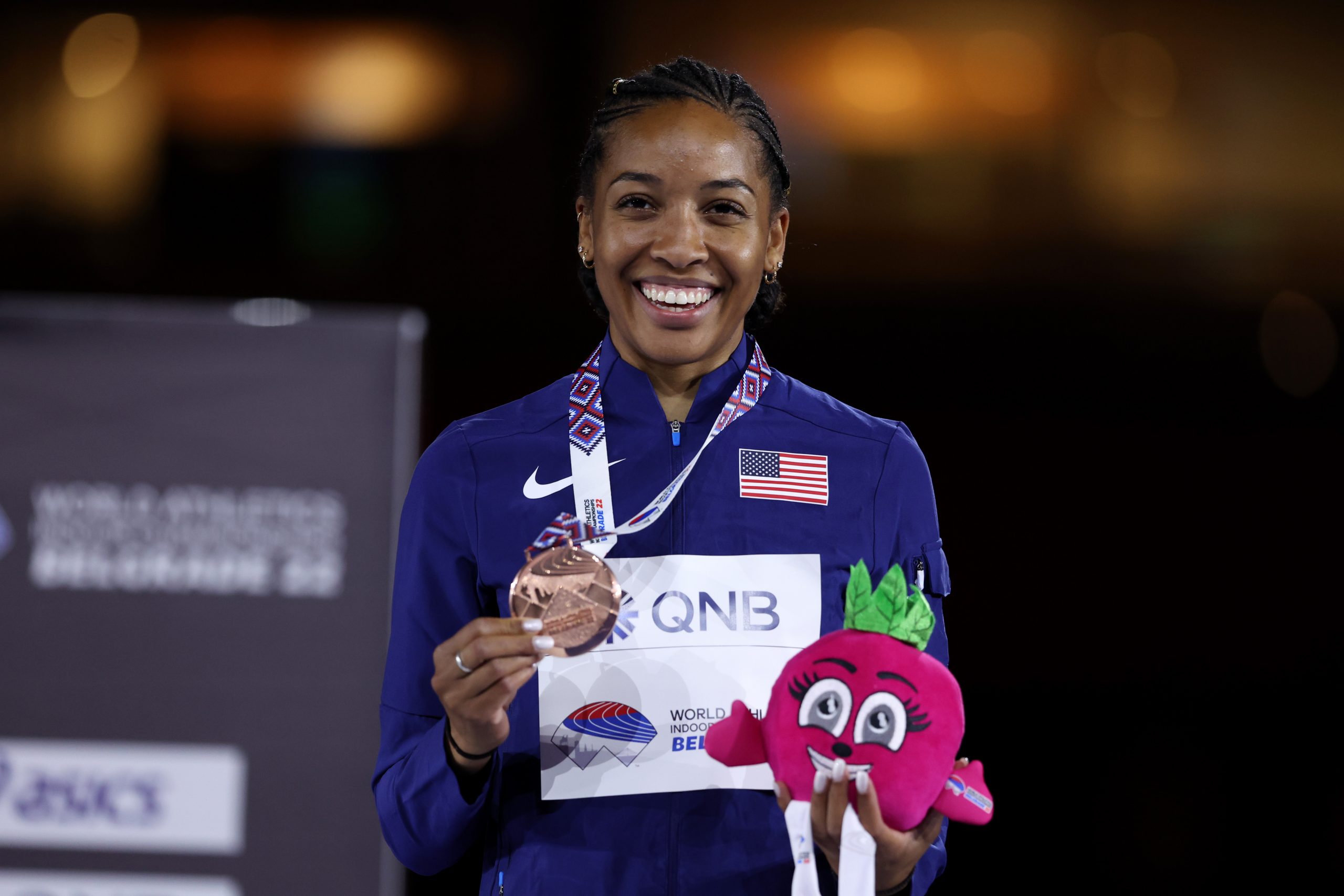
(Photo by Maja Hitij/Getty Images for World Athletics)

